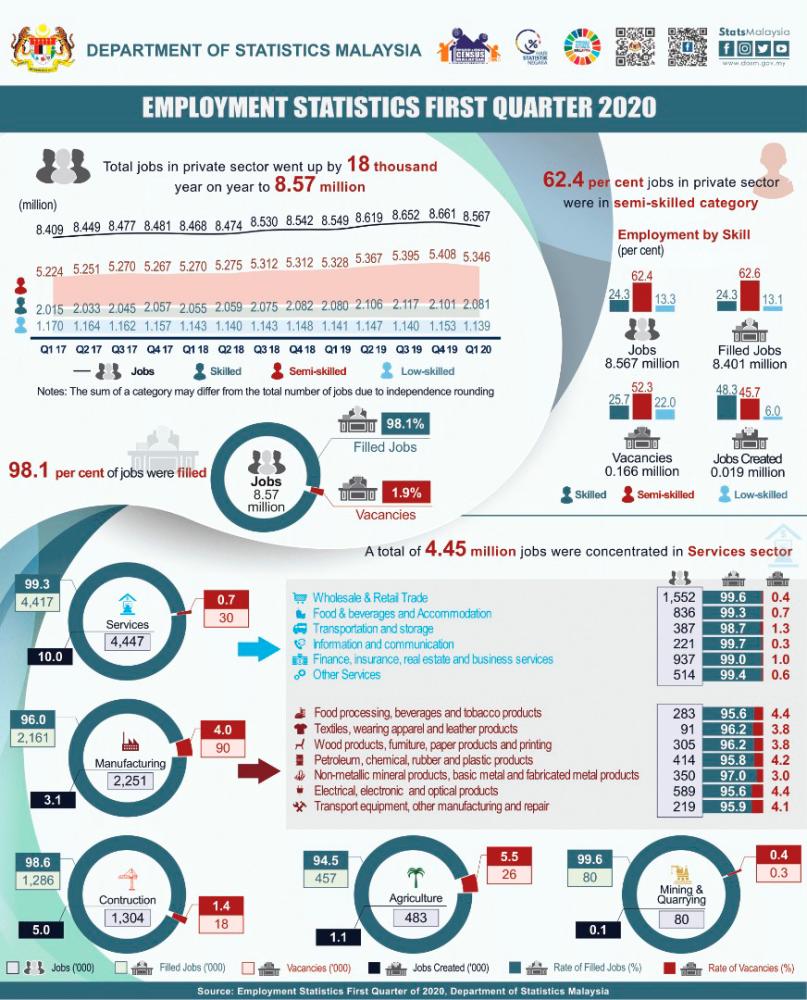PETALING JAYA: The rate of job vacancies for the first quarter of the year fell to 1.9% after registering 2.3% in Q4’19, due to the cautionary steps taken by the industry amid slower economic performance of the country.
In a statement, the Department of Statistics said a total of 166,000 job vacancies was recorded in the private sector for the first quarter of 2020, a drop of 35,000 as compared to a year ago.
“Nevertheless, the effect of the movement control order (MCO) to contain the Covid-19 pandemic was not fully reflected in the labour demand situation for the first quarter of 2020 since it was only implemented during the last two weeks of March 2020,” it said.
Overall, the number of jobs in the private sector, comprising filled jobs and job vacancies, went up to 8.6 million in the first quarter of 2020. Following the slower growth of filled jobs and decrease in job vacancies, the number of jobs during this quarter grew marginally as compared to the past four quarters in 2019.
Chief statistician Datuk Seri Mohd Uzir Mahidin noted that the job vacancies were predominantly in the semi-skilled category with 52.3%, while the skilled category represented 25.7%.
“For the first time, the rate of filled jobs reached 98.1%, translating into 8.4 million jobs this quarter. Nonetheless, the increase of 51,000 filled jobs in this quarter was lower compared to the annual increases of the previous quarters in 2019 which ranged from 83,000 to 128,000,” he said.
Breaking down labour demand by sector, Mohd Uzir said the services sector was the largest contributor, making up 51.9% or 4.4 million total jobs.
“Jobs in this sector were largely in wholesale and retail trade (34.9%) and the finance, insurance, real estate and business services (21.1%) subsectors. These two subsectors combined made up of more than half the jobs in the services sector.
“The rate of filled jobs for this sector increased to 99.3%, while the rate of vacancies was 0.7%,” he added.
Meanwhile, manufacturing sector accounted for 26.3% with 2.3 million jobs, the construction sector made up 15.2% with 1.3 million jobs and jobs in agriculture and mining & quarrying comprised of 5.6% and 0.9% respectively.
As a whole, 1Q’20 observed a softer labour demand as the Covid-19 pandemic spread and the government reacted to contain it. As labour demand shrinks, workers are at risk of a pay cut while job seekers are expected to face very challenging times in securing employment.
Mohd Uzir cautioned that Malaysia’s labour market will soften further in the second quarter, due to the impact of the extended phases of MCOs.
“On top of that, slower global demand will give more pressure to the labour market, which will lessen labour demand, particularly in the international trade and tourism- elated industries. In this regard, a quick adjustment to the labour market disequilibrium is essential to increase demand for jobs and consequently reduce unemployment,” he said.









